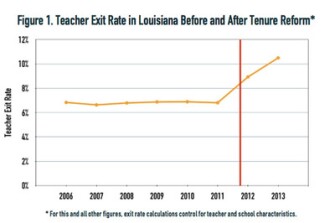
In 2012, the Louisiana legislature weakened teacher tenure, resulting in the loss of up to 1,700 public school teachers in the following two years, .
Beginning in the 2012-2013 school year, Louisiana teachers could only earn tenure after getting a “highly effective” rating on their evaluations for five of six consecutive years. Even if a teacher earned tenure under this new system, it could be revoked with just one “ineffective” rating. Bottom line: No Louisiana teachers enjoy permanent job protections, according to the study’s authors.
The teachers who left in the two years that followed did not do so because of low ratings on evaluations, since those wouldn’t have been available until 2014, say the study’s authors. More likely, teachers viewed the changes to tenure, a benefit they highly regarded, as a loss in job value and headed for the door.
69´«Ă˝ with the lowest test scores, which are also the most difficult to staff, saw the highest number of teachers leaving. Teacher exits from F-rated schools increased by 2 percentage points per year, while exits from A-rated schools didn’t change. The authors could not determine from their data whether the teachers leaving were effective or not. But the authors point to research showing that experienced teachers typically don’t take positions in underperforming schools.
The authors warn districts looking to eliminate tenure to consider the negative effect that teacher exits could have on student achievement. This article in Education Week Teacher looks at the effects of an increasingly less experienced teaching force. New teachers face a steep learning curve. They’re figuring out lesson plans, classroom management, school culture, and a bunch of other challenges all at once. It’s no wonder their performance isn’t optimal in the first few years.
Districts must also be prepared to spend money to replace the teachers who leave, according to the authors. Recruiting, hiring, and training just one new teacher can run districts between $4,000 and $18,000.
And the authors found that the teachers who leave are those who can get the full benefits of their pensions immediately. So pension systems may take a hit from a sudden surge in retirements. Of course, in the end, districts may save money if retirees are replaced by new, lower-paid teachers. But on the flip side, districts are losing their most-experienced teachers, those with at least 25 years in public school classrooms, according to the authors.
The study comes at a time when public support for teacher-tenure laws is in decline. Emmanuel Felton writes about the showing the lowest level of public support for teacher-tenure laws in its 10-year history. Yet among teachers, support for tenure is up, with 67 percent of educators saying they support the protections, up 10 percentage points from 2014. These results support other findings that teachers value the job security that tenure brings. The study’s authors recommend that districts that are suffering teacher shortages, and are also making the path to tenure more difficult, consider offering teachers a higher salary or other incentives in order to make up for decreased job security.
Chart Courtesy of Education Research Alliance for New Orleans